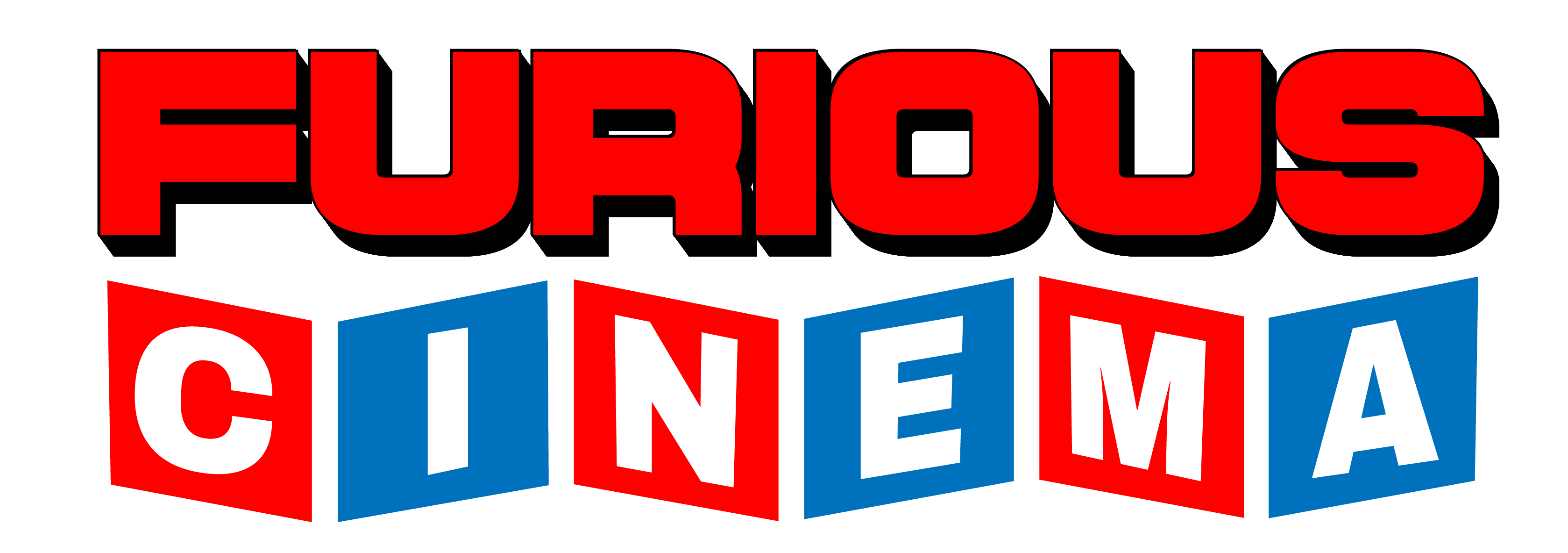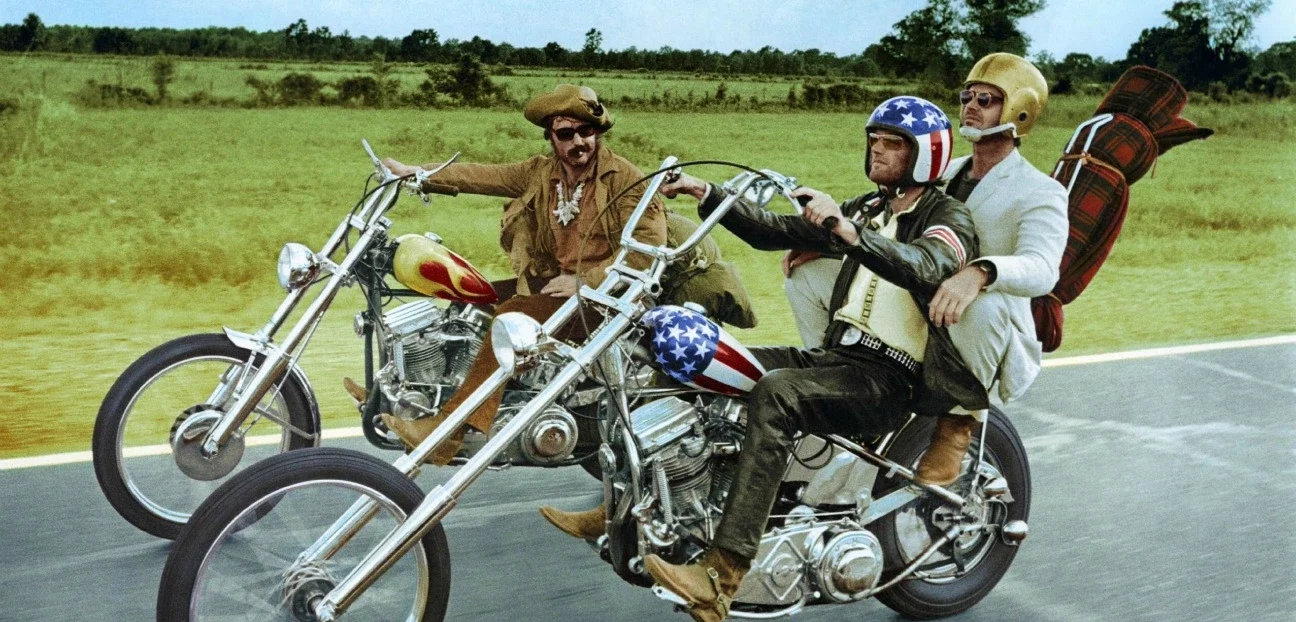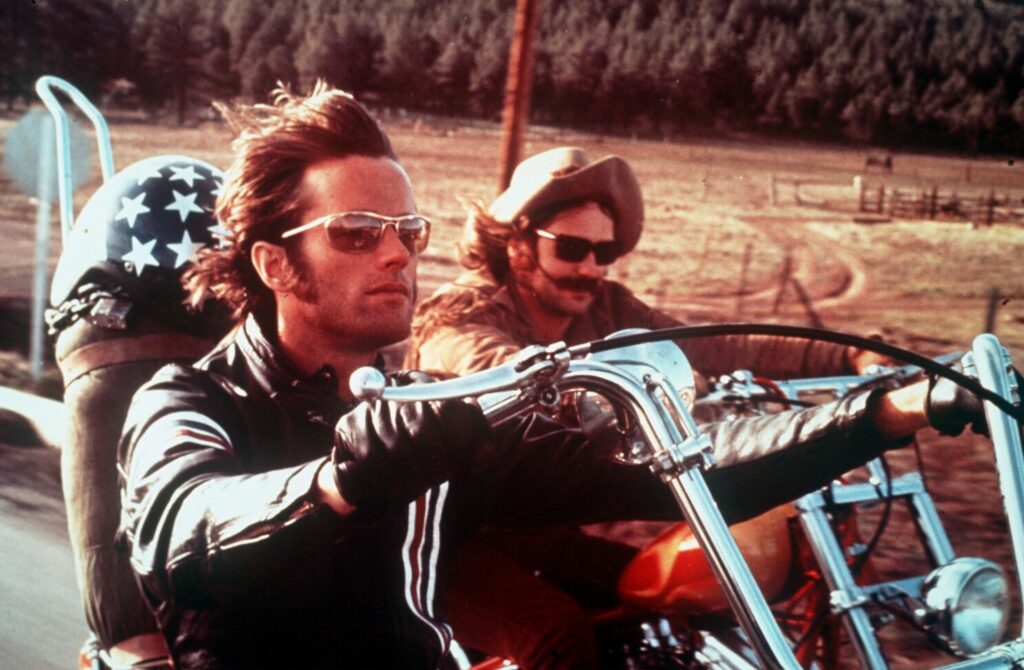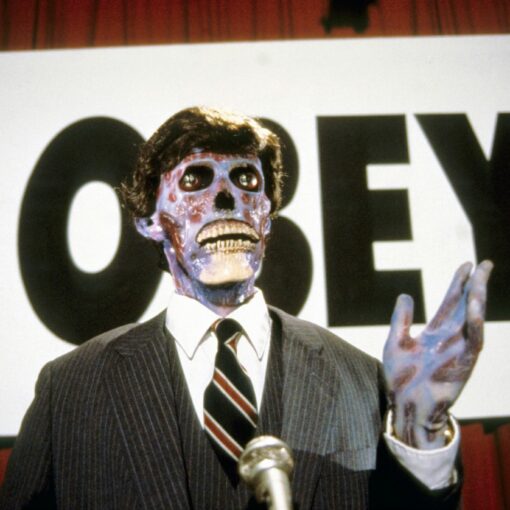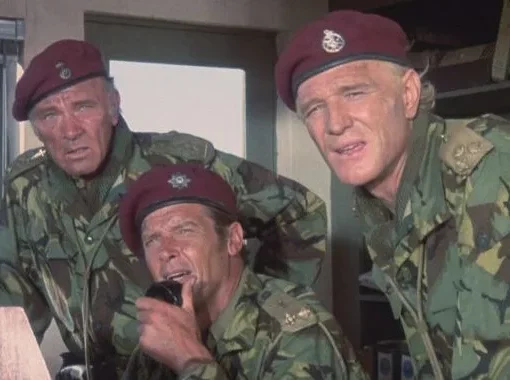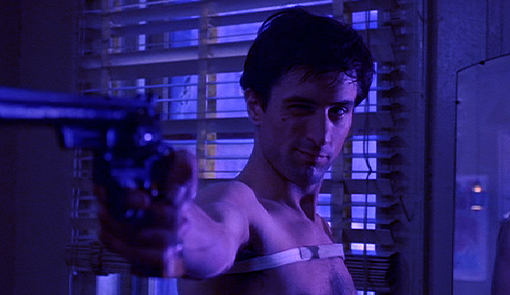A few weeks ago, I watched a Brian Wilson biopic called “Love & Mercy” for a review here at Furious Cinema. I remembered that the drummer, Dennis Wilson, also appeared in a film called “Two-Lane Blacktop”, which I haven’t seen in 7 or 8 years. The only thing I recall about that film is that it’s quite similar to Easy Rider since it’s quite artsy and needs to be interpretated by the audience. Therefore, this week I’ll review not only Two-Lane Blacktop, but also Easy Rider and Vanishing Point (for our “Road To Freedom” series) because what these three movies have in common are motorized engines, innovative storytelling and symbolism.
I decided to kickstart it with Easy Rider since it’s one of my favorite movies. Plus, this is one of those movies which I wanted to write an analysis for to see the meaning of it. While many people tend to remember only Steppenwolf’s rockin’ Born To Be Wild title song and the iconic “biker” image, this is not one of those “Wooo-Hoo! We’re gonna ride bikes and have a good time, maaan!” kind of movies. In fact, I categorize Easy Rider as a combination of “road movie” and “arthouse film” since it doesn’t have a standard Hollywood storyline, it utilizes innovative editing techniques and is filled with lots of symbolic messages.
The premise here is quite simple. Two hippies, Wyatt aka Captain America (Peter Fonda) and Billy (Dennis Hopper) have just finished selling cocaine to a rich buyer (Phil Spector) and receive lots of money. Thus, they decide to celebrate the “American Dream” by traveling to New Orleans to attend the Mardi Gras festival on their motorcycles. That’s it. That’s the story. The rest of the film is their adventures making new friends and facing various obstacles. Now, before I start analyzing each scene, there’s one thing I have to remind you about. The tagline on the poster and in the trailer is “A man went looking for America. And couldn’t find it anywhere…”. That is the main theme of what poor Wyatt and Billy have to face.
So after receiving the money and hiding it in his bike’s gas tank, Wyatt decides to take off his watch and throw it away. Why? I think this is because he wants to be free from worrying about time and then he go be anywhere, without thinking about whether it is morning or afternoon. After the epic “Born To Be Wild” montage (and being turned away at a cheap motel), Wyatt and Billy arrive at a small farmhouse to repair their bikes and have a meal with the ranch owners’ family. What we have here is an archetype of the nuclear family. We have the white father, Mexican mother, and several kids praying to Jesus before eating. This is the antithesis of what Wyatt and Billy are since this family is The Waltons version of “freedom”, in which everyone sticks to religion and family values as well as having the nice house and small business in pursuit of All-American happiness. But Wyatt and Billy basically represent the counterculture movement that rejects those 50’s values through their clothing, music and drug-fueled lifestyle. Therefore, they can’t stay there long. However, Wyatt is nice enough to respect people who have different mindset from them (which is something that’s quite rare nowadays, unfortunately) and says…
“No, I mean it. You’ve got a nice place. It’s not every man that can live off the land, you know? Can do your own thing in your own time. You should be proud.”
Then, they move on and pick up a hitchhiker (Luke Askew). We later learn that he’s trying to run away from his big hometown city and wants to be someone else (he claims that he wants to be Porky Pig). The next day, our heroes take him to his destiny: a small hippie commune. We might infer that he’s an example of what American teenagers actually did in the 60’s: left home and lived together in a small place that was filled with sex, drugs, astrology, and music. In fact, this commune has all of them! This is what the hitchhiker says about this place…
“These people got here late in the summer. Too late to plant. But the weather was beautiful…and it was easy living. And then came that winter. There were 40 or 50 living in a one-room place. Nothing to eat, out by the side of the road looking for dead horses. Anything they could get ahold of. There’s 18 or 20 left. And they’re city kids. Look at them. But they’re getting this crop in. They’ll stay here till it’s harvested. That’s the whole thing.”
However, shortly before that, there are characters that try to analyze this line from their book…
“Starting brings misfortune. Perseverance brings danger. Not every demand for change in the existing order should be heeded. On the other hand, repeated and well-founded complaints…should not fail to a hearing.”
I think this might be a slight jab at the hippie movement at the time since it predicted the downfall of it. The revolution of the late 60’s was over because, later on it was less about a big change for a better future and more about just getting high and having sex. It became all about whining and not about doing something.
While Wyatt seems to enjoy the “freedom” of the commune, Billy can’t stand the goofy rituals of the place and tells him it’s time to move on. This is one of the scenes that shows us the difference between each character in the beginning: Wyatt is the optimistic laid-back guy, while Billy is pessimistic and hostile. As the story progresses, their thoughts are slowly swapped.
Later on the road they get arrested since they join a local small town parade on their bikes without permission. They spend some time in jail and befriend a cellmate named George Hanson (played by the great Jack Nicholson). George is an ACLU lawyer who repeatedly gets tossed in jail for drunken behavior. His view of freedom means having sex at a whorehouse in New Orleans and having equality of life like what aliens are doing. Yep. He’s a conspiracy theorist who believes in UFOs as well…
“They’ve been comin’ here ever since 1946, when the scientists first started bouncin’ radar beams off of the moon. And they have been livin’ and workin’ among us, in vast quantities, ever since. The government knows all about ’em. […] Well, they are people just like us. From within our own solar system. Except that their society is more highly evolved. I mean, they don’t have no wars, they got no monetary system, they don’t have any leaders; because, I mean, each man is a leader. I mean, each man – because of their technology, they are able to feed, clothe, house, and transport themselves equally and with no effort. […] Why don’t they [the aliens] reveal themselves to us – is because if they did, it would cause a general panic. Now, I mean, we still have leaders upon whom we rely for the release of this information. These leaders – have decided to repress this information because of the tremendous shock that it would cause to our antiquated systems. Now, the result of this has been that the Venutians have contacted people at all walks of life, all walks of life – Yes! It would be a devastin’ blow to our antiquated systems. So, now Venutians are mating with people in all walks of life in an advisory capacity. For once, man will have a god-like control over his own destiny. He will have a chance to transcend and to evolve with some equality for all.”
It sounds goofy as hell, especially in the age of internet trolls and the post-truthers era, but back then, this was an interesting movement that brought us Bigfoot and fun stuff like that. Nonetheless, at least George has something to believe in. Something about advancing equality for all. Something against the government. However, the next day they go to a diner and, while some young giggly chicks are excited about their appearance, some rednecks make fun of them. As I said, the counterculture of 60’s was totally against the traditional values and seen as a threat. That’s why the rednecks hate them and they have this following conversation later that night…
“George Hanson: You know, this used to be a helluva good country. I can’t understand what’s gone wrong with it.
Billy: Man, everybody got chicken, that’s what happened. Hey, we can’t even get into like, a second-rate hotel, I mean, a second-rate motel, you dig? They think we’re gonna cut their throat or somethin’. They’re scared, man.
George Hanson: They’re not scared of you. They’re scared of what you represent to ’em.
Billy: Hey, man. All we represent to them, man, is somebody who needs a haircut.
George Hanson: Oh, no. What you represent to them is freedom.
Billy: What the hell is wrong with freedom? That’s what it’s all about.
George Hanson: Oh, yeah, that’s right. That’s what’s it’s all about, all right. But talkin’ about it and bein’ it, that’s two different thangs. I mean, it’s real hard to be free when you are bought and sold in the marketplace. Of course, don’t ever tell anybody that they’re not free, ’cause then they’re gonna get real busy killin’ and maimin’ to prove to you that they are. Oh, yeah, they’re gonna talk to you, and talk to you, and talk to you about individual freedom. But they see a free individual, it’s gonna scare ’em.
Billy: Well, it don’t make ’em runnin’ scared.
George Hanson: No, it makes ’em dangerous. Buhhhh! Neh! Neh! Neh! Neh! Neh! Neh! Swamp!”
But in the end, what does the freedom mean? Freedom to express something? Freedom to say that we disagree about something against our values? Do those rednecks have a freedom to hate our heroes? Anyway, later the rednecks attack our heroes and kill poor George as he sleeps.
Finally, our heroes make it to New Orleans and go to the whorehouse that George recommends to them. They hang out with two hookers (Karen Black and Toni Basil), and hit the streets to see the big Mardi Gras festival, do some drugs and have sex. But before that, Wyatt sees this quote on the wall…
“Death only closes a man’s reputation and determines it as good or bad.”
Along with flashes that cut to the tragic ending, this foreshadows what’s going to happen to our hero. Then, if that’s not enough, they later have an LSD trip in a cemetary while we hear someone praying about life and death! After the legendary trippy montage, we hear Wyatt say the famous “We blew it” line (while Billy still thinks that they should use money to start a new life…see how their minds get swapped now?). What does that line mean? Well, they finally arrived in New Orleans, but still have no idea what freedom and the pursuit of happiness is. Several concepts of freedom come and go, but none of them satisfy the main characters. Why? Is it because they don’t have a clear concept of happiness and freedom in the first place? Is it because the sex and drug-fueled counterculture got them nothing? Do their lives only reflect the life of all young adults who are chasing something blindly and pretend to believe that it’s what they want? There are so many more questions that you can discuss after watching it.
Finally, we see Wyatt and Billy get killed by two rednecks. Again. Some might view it as a tragic ending, but those rednecks are going to abuse the term “freedom” to hate our heroes and kill them anyway. This might be the reason Peter Fonda said that one of the main themes of Easy Rider is…
“Liberty’s become a whore, and we’re all taking the easy ride.”
Because in the end, nobody can say exactly what liberty means! We are going to yell out this word to satisfy ourselves and…that’s all! But in the end, no matter how you interpret this film, Easy Rider is a very unique experience. There’s no way a film like this will be made again and have the same impact. It’s artsy, thought-provoking, and charming. I highly recommend both the film and soundtrack album (I have it on CD and is worth listening to while you are driving).
Tomorrow, we’ll take a look at what people call “Universal Pictures’ answer to Easy Rider”: Two-Lane Blacktop.
